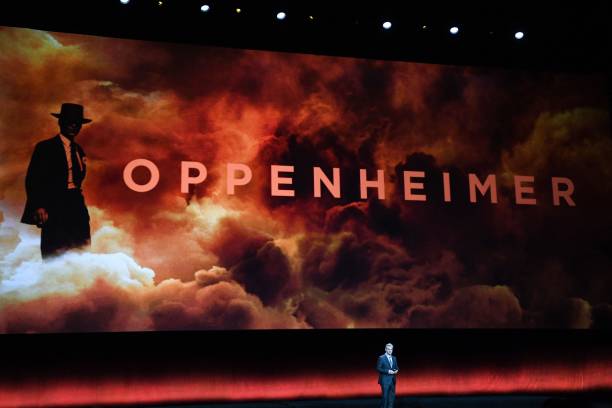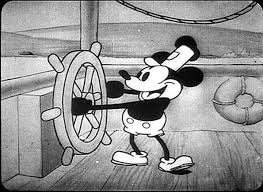This review was written during the 2023 SAG-AFTRA and WGA strikes. Any material discussed would not be possible without the labor of the actors and writers on strike. To find out more about the strikes, click here (SAG) or here (WGA).
This review contains spoilers for Oppenheimer.
One of the most well-known stories in Greek mythology is of Prometheus, the god of fire. Going against the wishes of the other gods, Prometheus stole fire and gave it to man. Of course, fire in this story serves more as a metaphor for technology and civilization as a whole. The story tells of a higher being giving humanity a power that it was not yet ready to wield.
The most famous real-life comparison to Prometheus, and perhaps the most obvious, is the so-called father of the atomic bomb, J. Robert Oppenheimer. Kai Bird and Martin Sherwin’s award-winning biography of Oppenheimer, American Prometheus, even derives its name from the myth of the Greek god. In spite of Matt Damon’s admiration for the book’s name, however, Christopher Nolan wanted his adaptation of the biography to be titled Oppenheimer. According to Damon, who plays General Leslie Groves in the movie, the name change came from Nolan’s desire to depict the events of the Manhattan Project from the perspective of the bomb’s inventor. In the film’s writing process, Nolan wrote the script of the film from Oppie’s first person point of view. In the filming process, Nolan used color and black and white shots to separate the movie’s objective documentary scenes from those displaying the personal experience of Oppie.
This dynamic lends the movie significant advantages over other biopics. Big-money ‘based on a true story’ type films often fail to tell a particularly accurate depiction of events. A visual distinction between scenes intended to be factual and those meant as subjective lets the viewer know when they’re watching a documentary versus when they’re watching a character study. This is just one aspect of the film that makes Oppenheimer work so well. Nolan’s direction, the brilliance of the cast led by Cillian Murphy as Oppie, Ludwig Goransson’s score, and the movie’s excellent visual effects all contribute to a film that is among the best pictures of the last few years.
More on the cast–the movie features a ridiculously long list of stars and actors you will recognize from something somewhere. Murphy, starring in his sixth Christopher Nolan film, gives an excellent performance portraying Oppie during numerous points in his life. Emily Blunt has some of the most memorable lines and scenes in the film portraying Kitty Oppenheimer, J. Robert’s wife. Robert Downey Jr. has potentially the best performance in the film as Lewis Strauss. Every other big-name actor, from Florence Pugh to Casey Affleck to Rami Malek, all have their moments to shine. The film’s music has also been correctly and widely praised, with Goransson providing a violin-centric score that illustrates the protagonist’s ascension from a theoretical physicist to one of the most important men to ever live.
On the topic of its direction, Oppenheimer is undoubtedly made in Christopher Nolan’s unwavering style. The fast-paced editing of his films is present and helps the 3-hour film move along at a brisk pace. The movie, infamously at this point, also uses exclusively practical effects. The use of IMAX cameras coupled with the meticulously crafted visuals contributes to a film that looks better than it has any right to be. The scene depicting the Trinity test, in particular, is a standout example of the movie’s brilliant presentation. Not only is the scene notable for demonstrating how grounded effects can immerse the audience into the film, but it is also one of Oppenheimer’s few scenes without music, which helps build a suspense while counting down to the bomb’s detonation.
While the film excels from a technical standpoint, emotional aspects are of more importance with this kind of movie. While there would’ve been few doubts about the visuals or cast, the personal elements of Nolan’s films have been criticized in the past. Past criticism notwithstanding, the movie does a fantastic job in exploring the mind of Oppie. There are numerous scenes that showcase Oppenheimer’s emotions in an engaging manner, such as the ripple of the water or the stomping of the audience’s feet when Oppie gives a speech. Additionally, some of the strongest scenes in the movie feature Oppenheimer and his loved ones in dramatic moments. The scene between Oppie and his wife Kitty following the death of Jean Tatlock is a standout example of this (Kitty’s line, “You don’t get to commit sin, and then ask all of us to feel sorry for you when there are consequences,” is one of the best in the film).
As I alluded to earlier, it’s difficult to find a real purpose to most modern biopics. Life rarely follows a concise, three-part arch, so the genre tends to take creative liberties at the expense of historical accuracy. As such, it’s difficult to justify their existence as anything other than a ploy for studios to make an easy profit. Christopher Nolan isn’t the kind of director who would be satisfied with creating anything other than his own directorial vision, and as such Oppenheimer is made with a clear purpose. The film is an exploration of human emotion. It documents how the hubris of one of the smartest men to ever live drove him to create a weapon that killed hundreds of thousands of people. The movie is alo a stark condemnation of nuclear warfare, with the film’s last line (Oppie telling Tom Conti’s Albert Einstein that he believes his invention would destroy the world) serving as a daunting reminder of the danger of the power J. Robert Oppenheimer gave humanity.



















